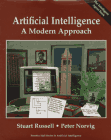 |
CS 371 - Introduction to Artificial Intelligence
Course Information |
Course Overview
A most fascinating research field, I like to describe Artificial Intelligence
(AI) as the interesting "miscellaneous pile" of computer science.
For example, more expressive, computationally-complex database research
finds its home in AI as "knowledge representation and reasoning".
The inverse of computer graphics is machine vision. Where do you
think the object-oriented paradigm reached its maturity? Many interesting,
cutting-edge problems and developments find their birthplace and first
home in this ambitious and visionary research community.
Presented with the unifying theme of constructing intelligent software
agents, we survey an interesting variety of research problems and modern
problem solving techniques. Among the topics we cover are: search,
game-tree search, constraint satisfaction, knowledge representation and
reasoning, reasoning under uncertainty, robotics, and philosophical
foundations.
Text
Instructor
Todd Neller
Lecture: Glatfelter 203, T,Th 8:30-9:45AM
Office: Glatfelter 209
Office Hours: M-F 10-10:45AM or by appointment. Note:
Generally, feel free to drop in if my office door is open. If it
is closed, I'm desperately seeking to keep on top of things and rabid attack
ferrets may drop from the ceiling in my defense.
Phone: 337-6643
E-mail: 
Grading
80% Assignments
10% Quizzes / Exams
10% Attendance / Participation
You are responsible to know the material from each lecture and reading
assignment before the start of the next class. Homework is due at
the beginning of lecture on the due date. Late homework will not
necessarily be accepted. Source code which does not compile may not
receive partial credit. Class attendance and participation is required.
If you attend all classes and are willing to participate, you'll get 100%
for this part of your grade. Even if you know enough to give a particular
lecture, please consider the value of helping your peers during in-class
exercises.
Honor Code
Honesty, Integrity, Honor. These are more important than anything
we will cover in this class. Students can and are encouraged to help
each other understand course concepts, but all graded work must be done
independently unless otherwise stated. In group work, great care
must be given to "giving credit where credit is due". For detailed
information about the honor code, see http://www.gettysburg.edu/college_life/orgs/honor_code/index.html.


